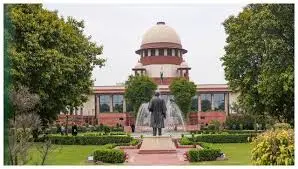‘India is not a dharmshala’: Supreme Court rejects Sri Lankan man’s plea seeking refuge

The Supreme Court of India recently made a clear and firm ruling. It rejected a plea from a Sri Lankan man who wanted to stay in India after serving a prison sentence. The court emphasized that India, with its population of 1.4 billion, cannot act as a “dharamshala” — or shelter — for foreigners without proper legal grounds. This decision highlights India’s strict immigration policies and the importance it places on national security.
The Case Background
The petitioner is a Sri Lankan Tamil who had lived in India for several years. He was convicted under the Unlawful Activities (Prevention) Act (UAPA), a tough law aimed at combating terrorism. The charges linked him to the Liberation Tigers of Tamil Eelam (LTTE), a banned militant group. The LTTE sought an independent Tamil state in Sri Lanka and is proscribed in India and other countries due to its violent past.
After serving a seven-year prison term, the man asked to remain in India. He claimed that going back to Sri Lanka would put his life at risk. He also said his wife and children live in India, and separating from them would cause hardship.
Supreme Court’s Message: India Cannot Be a Shelter for Everyone
The Supreme Court rejected his plea and supported the Madras High Court’s order for deportation. The judges stated that only Indian citizens have the right to settle in India. Foreign nationals do not have an automatic right to live here.
The court clearly said India cannot be treated as a “dharamshala” or a free shelter for foreigners who break the law or pose security risks. While India values humanitarianism, it must balance kindness with the country’s interests.
The judges warned that allowing all foreigners, especially those convicted of serious crimes, to stay would threaten India’s sovereignty and strain its resources. The court stressed that India’s immigration laws aim to protect both compassion and security.
Legal and Security Aspects
This ruling reaffirms important legal principles. The UAPA is one of India’s toughest laws to fight terrorism and protect national security. People convicted under it face strict penalties, including deportation if they are foreigners.
Letting foreigners convicted under anti-terror laws stay could set a dangerous precedent. The Supreme Court’s firm stance acts as a deterrent and strengthens the government’s control over immigration.
India faces ongoing threats from militant groups and cross-border terrorism, especially near its borders with Pakistan, Bangladesh, and Sri Lanka. The LTTE remains a symbol of separatist violence. The government closely monitors anyone with links to such groups. The court’s decision helps maintain peace and security by denying shelter to those involved in militancy.
Balancing Humanitarian Concerns
Despite the strict ruling, this case raises tough humanitarian questions. India has welcomed many refugees, including Tibetans, Sri Lankan Tamils, and Rohingyas. The country has a tradition of offering shelter to those fleeing violence and persecution.
However, this case shows the difficulty of balancing compassion with law and security. The Supreme Court ruled that humanitarian concerns must respect legal processes. Compassion cannot override national security or the rule of law.
This decision might lead policymakers and NGOs to rethink how India handles refugees and asylum seekers, especially those linked to political or militant groups. India needs clear policies that protect vulnerable people while safeguarding the nation.
Mixed Reactions to the Verdict
The ruling received mixed responses. Some human rights groups worry that deporting the petitioner could endanger him in Sri Lanka, where Tamils have faced discrimination and violence. They call for stronger asylum protections.
Others see the verdict as a necessary assertion of India’s right to control its borders. They welcome the clarity it provides on handling foreigners convicted of serious crimes.
This case also reflects ongoing challenges related to Tamil refugees in India. Many fled Sri Lanka’s civil war, which lasted from the 1980s to 2009. While India has sheltered many, their legal status remains complicated. The court’s decision reaffirms that only citizens have full settlement rights.
Conclusion
The Supreme Court’s rejection of the Sri Lankan man’s plea sends a strong message. India, though known for its hospitality, cannot serve as a “dharamshala” for all foreigners, especially those convicted under anti-terror laws.
This ruling stresses that India must prioritize national security and uphold the rule of law. It also highlights the challenge of balancing humanitarianism with sovereignty.
As India grows in global influence, cases like this will shape its immigration policies and how it balances security, human rights, and international relations. For now, the court’s decision confirms that settling in India requires citizenship and respect for the country’s laws.






